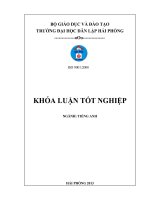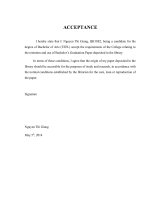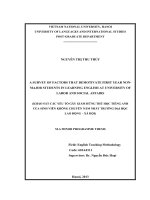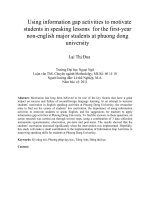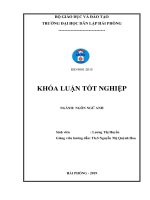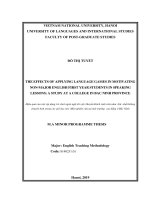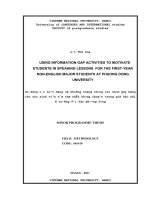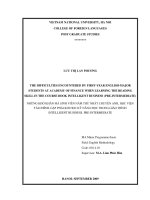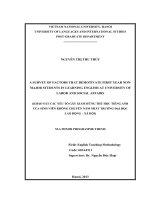Difficulties facing vnuas first year advanced programmes students in speaking lessons
Bạn đang xem bản rút gọn của tài liệu. Xem và tải ngay bản đầy đủ của tài liệu tại đây (592.37 KB, 59 trang )
VIET NAM NATIONAL UNIVERSITY OF AGRICULTURE
FACULTY OF EDUCATION AND FOREIGN LANGUAGES
BA THESIS
DIFFICULTIES FACING VNUA’S FIRST-YEAR
ADVANCED PROGRAMMES STUDENTS IN
SPEAKING LESSONS.
(NHỮNG KHÓ KHĂN CỦA SINH VIÊN NĂM NHẤT
CHƯƠNG TRÌNH TIÊN TIẾN TRONG CÁC GIỜ HỌC NÓI )
Student: NGUYEN THI THUONG THUONG
Student code: 621277
Major: ENGLISH LINGUISTICS
Supervisor: NGUYEN THI LAN ANH, M.A
Hanoi – 2021
VIET NAM NATIONAL UNIVERSITY OF AGRICULTURE
FACULTY OF EDUCATION AND FOREIGN LANGUAGES
BA THESIS
DIFFICULTIES FACING VNUA’S FIRST-YEAR
ADVANCED PROGRAMMES STUDENTS IN
SPEAKING LESSONS.
(NHỮNG KHÓ KHĂN CỦA SINH VIÊN NĂM NHẤT
CHƯƠNG TRÌNH TIÊN TIẾN TRONG CÁC GIỜ HỌC NÓI)
Student: NGUYEN THI THUONG THUONG
Student code: 621277
Major: ENGLISH LINGUISTICS
Supervisor: NGUYEN THI LAN ANH, M.A
Hanoi – 2021
CERTIFICATE OF ORIGINALITY
I, the undersigned, hereby certify my authority of the study project report
entitled DIFFICULTIES FACING VNUA‟S FIRST-YEAR ADVANCED
PROGRAMMES STUDENTS IN SPEAKING LESSONS submitted in partial
fulfillment of the requirements for the degree of Bachelor in English Language.
Except where the reference is indicated, no other person‟s work has been used
without due acknowledgement in the text of the thesis.
Hanoi, 2021
Nguyen Thi Thuong Thuong
Approved by
SUPERVISOR
Date: ……………………
i
ABSTRACT
The focal point this thesis is to find out the difficulties facing the first year
advanced programmes students‟ English speaking performance, with the
objectives focusing on some suggestions to improve their English skills in
general and English speaking skill in particular. 80 students of VNUA‟s firstyear advanced programmes participated in completing the questionnaires and
eight out of eighty students were interviewed to get to know more about their
problems in speaking English class, the causes and efforts they have made to
improve their English speaking performance.
The initial results revealed that the main cause of the students facing
difficulties were two kinds of problems namely linguistic problems and nonlinguistic problems. Based on the finding, the hypothesis of the study was
formed: Practice make perfect, encouraging the students to speak English,
giving them a great deal of chances to speak, using English in class, asking them
to make English speaking environment and applying solutions studied. The
evaluation of the action plan revealed that the student motivation significantly
improved after the action plan implementation. Based on this finding, further
recommendation and deeper implications are provided.
ii
ACKNOWLEDGEMENTS
During the process of doing this graduation paper, I have received many
necessary assistances, precious ideas and timely encouragements from my
teachers, family and friends. This paper could not have been completed without
the help, encouragement and support from a number of people who all deserve
my sincerest gratitude and appreciation.
First of all, I wish to express my deepest gratitude to my supervisor – Mrs.
Nguyen Thi Lan Anh, the English teacher of English Department, who has
always been willing to give me valuable advices and suggestions in order that I
can complete successfully this study.
I would also like to express my great gratitude to all the teachers at
Vietnam national university of agriculture (VNUA) for their devoted teaching
and for giving me new knowledge and studying methods. Their teaching not
only helps me gain valuable knowledge during the four years at this university
but also lays the foundation for me in the future.
Last but not least, I wish to extend my special thanks to my family and my
friends for their assistance and encouragement in the making of this report.
Hanoi, July, 2021
Nguyen Thi Thuong Thuong
iii
TABLE OF CONTENTS
CERTIFICATE OF ORIGINALITY ..................................................................... i
ABSTRACT .......................................................................................................... ii
ACKNOWLEDGEMENTS ................................................................................. iii
TABLE OF CONTENTS ..................................................................................... iv
LIST OF ABBREVIATION ................................................................................ vi
LIST OF TABLES AND FIGURES ................................................................... vii
PART 1: INTRODUCTION ................................................................................ 1
1. RATIONALE FOR THE STUDY .................................................................... 1
2. AIMS AND OBJECTIVES OF THE STUDY ................................................. 2
3. RESEARCH QUESTIONS ............................................................................... 2
4. SCOPE OF THE STUDY ................................................................................. 3
5. SIGNIFICANCE OF THE STUDY .................................................................. 3
6. DESIGN OF THE STUDY ............................................................................... 3
PART 2: DEVELOPMENT .................................................................................. 5
CHAPTER 1: LITERATURE REVIEW ............................................................. 5
1.1. REVIEW OF THE PREVIOUS STUDIES (AT HOME & ABROAD) ....... 5
1.2. REVIEW OF THEORETICAL BACKGROUND ....................................... 8
1.2.1. Definition of speaking ................................................................................. 8
1.2.2. Types of speaking........................................................................................ 8
1.2.3. General outline of a speaking lesson........................................................... 9
1.2.4. The importance of English speaking skill ................................................. 10
1.2.5. Factors affecting the English speaking ..................................................... 13
CHAPTER 2: METHODOLOGY ...................................................................... 16
2.1. RESEARCH GOVERNING ORIENTATION ............................................ 16
2.2. RESEARCH METHODS............................................................................. 18
CHAPTER 3: FINDINGS .................................................................................. 21
iv
3.1 THE SURVEY RESULTS FROM QUESTIONNAIRE .............................. 21
3.2. RESULTS FROM THE INTERVIEW ........................................................ 26
3.2.1. The students‟ s assessment of learning speaking skill .............................. 26
3.2.2. Kinds of Student‟s Difficulties in Speaking ............................................. 27
3.2.3. Kinds of Student‟s Efforts in Speaking..................................................... 34
3.2.4. Suggestions on improving the students‟ English speaking performance . 37
3.3 Summary ....................................................................................................... 40
Part 3: CONCLUSION........................................................................................ 42
1. RECAPITULATION ..................................................................................... 42
2. CONCLUDING REMARKS ......................................................................... 43
3. LIMITATION OF THE STUDY .................................................................... 43
4. RECOMMENDATIONS/ SUGGESTIONS FOR FURTHER STUDY ....... 44
REFERENCES .................................................................................................... 45
APPENDIXES .................................................................................................... 48
v
LIST OF ABBREVIATION
VNUA: Vietnam National university of agriculture
EFL
: English as a Foreign Language
vi
LIST OF TABLES AND CHARTS
Table 2.1. Difficulties facing the VNUA‟s first-year advanced programmes
students in learning English speaking from their own perspective..................... 21
Table 2.2: The students‟ assessment of difficulty inlearning speaking skill ...... 27
Chart 2.1: The chart shows the percentage of the students‟ s assessment in
learning speaking skill ......................................................................................... 26
Chart 2.2: The chart shows the number of students facing difficulties related to
linguistic problems in speaking skill . ................................................................. 28
Chart 2.3: The chart shows the number of students facing difficulties related to
non-linguistic problems ....................................................................................... 29
vii
PART 1: INTRODUCTION
1. RATIONALE FOR THE STUDY
Speaking English is considered as an important language skill and
fundamental to human communication. Many people around the world use
English to communicate each other. Being able to speak English, people can
interact with others without obstacles. In addition, people speak English to
upgrade themselves to survive in the globalization era. As a researcher, I would
like to present the thesis title “A study on difficulties facing VNUA‟s first-year
advanced programmes students in speaking lessons” for several reasons. First of
all, speaking is the most important skill in communication in the real life. They
are closely interdependent. We are able to talk sensibly when we understand
what is said to us. If we fail to understand spoken language, we may miss
important information and respond in a funny way. Moreover, in learning a
language, speaking is a useful means of providing students with comprehensible
input, which is an essential component of the whole language learning process.
And teaching speaking skill in classroom helps students make transition from
classroom English to real-life English more easily and effectively. Therefore, I
would like to do this research to help the students and teachers pay more
attention to speaking skill. Secondly, Vietnamese student, especially the 1st year
advanced programmes students have a lot of difficulties in learning and
practicing English speaking skill. They often fall into confusion when speaking
English because lack of professional knowledge, confidence, and the good
learning method as well. Besides, the learning passive environment from high
school with the same and boring lessons without the interesting extra-activities
prevent them from practicing and improving English. That is the main reason
they don‟t get the effective result in learning speaking in university. After
1
studying at Vietnam national university of agriculture (VNUA), for nearly four
years, I realize that the first-year students of advanced programmes still have
many difficulties in their speaking skill. In the hope of finding out the
difficulties of speaking that they normally get, a study entitled: “Difficulties
facing VNUA‟s first-year advanced programmes students in speaking lessons”
has been conducted because of all above mentioned reasons.
2. AIMS AND OBJECTIVES OF THE STUDY
This study is aimed at finding out the difficulties facing the first year
advanced programmes students‟ English speaking performance, with the
objectives focusing on some suggestions to improve their English skills in
general and English speaking skill in particular. Within my reach of
understanding, I would only like to go through the Literature Review of
speaking, the common strategies to improve the students‟ English speaking skill,
then I would like to give the methodology of the study research, which is a
research survey, to find out “Difficulties facing VNUA‟s first-year advanced
programmes students in speaking lessons and suggestions on improving their
English speaking performance”
3. RESEARCH QUESTIONS
The study aims at addressing the following questions:
(1) What are the difficulties facing VNUA‟s first-year advanced
programmes students in learning speaking?
(2) What are the causes behind those difficulties?
(3)
What are the suggestions on improving the students‟ English
speaking performance?
2
4. SCOPE OF THE STUDY
Object of the study were 80 students in advanced programmes, Including
class English A1 (19 students), English A2 (22 students), English A3 (25
students), English A4(14 students) and Take Away 3 syllabus with similar
English proficiency for nearly 12 weeks from 12th April to July 4th, 7 credits,
(3 lessons a week, 2,5 hours a lesson ) . The notes taken by the researcher
during eight lessons within two months are used to make up the questionnaire to
ask for the students‟ opinions on difficulties facing them in speaking lessons.
Basing on the questionnaire results, the researcher would like to give out some
suggestions on improving the students‟ English speaking performance”
5. SIGNIFICANCE OF THE STUDY
The study research into difficulties facing VNUA‟s first-year advanced
programmes students is of significance. Therefore, it should be beneficial as it
not only pinpoints problems students have in speaking English, but also
indicates the weaknesses students have in the four macro skills of English. As a
result, the right methods can be used to address those problems, and the course
can be improved to help the students develop their English speaking skill. I
hope I will be able to learn how to read on line and improve a lot of skills such
as reading, doing researches, summarizing and paraphrasing. I also hope that the
findings of the research will really be necessary knowledge that helps me to
understand more about English to improve my English language skills.
6. DESIGN OF THE STUDY
The Graduation Paper is divided into 3 Parts with an introduction and a
conclusion:
Part 1: briefly introduces the background information of the study, rational for
the study, the aims, objectives of the study and the research questions
3
which are going to be addressed in the study. The scope of study, its
significance and structure are also raised in this chapter.
Part 2: Development
Chapter 1: Literature review: consists of theoretical framework of teaching
speaking skills and the debate technique and previous studies related to
the thesis.
Chapter 2: Methodology chapter, will make it clear how the present
The study was implemented, including information about context, participants,
and procedures, instrumentation and data collection. Methods of analysis
will also be addressed in this chapter.
Chapter 3: Analysis of a range of data collected from various sources (the survey
results from questionnaire and results from the interview) for the study
will be clarified in this chapter.
Part 3: Conclusion : summarizes the main issues that have been addressed in
the study, points out the limitations, draws pedagogical implications
concerning the research topic and suggests several solutions.
4
PART 2: DEVELOPMENT
CHAPTER 1: LITERATURE REVIEW
1.1. REVIEW OF THE PREVIOUS STUDIES (AT HOME & ABROAD)
Speaking is an important part of learning and teaching a second language.
Despite its importance, for many years, teaching speaking was undervalued and
English teachers continued to teach speaking just as a repetition of exercises or
memorization of conversations. However, today's world demands that the goal
of learning to speak should be to improve students' communication skills,
because, only in that way, can students express themselves and learn to follow
the rules. appropriate socio-cultural rules in each communication situation. That
is why, there have been a lot of studies on English speaking skill, including A
study on group works - A technique used in teaching speaking skill for the 2nd –
Year English major students at HPU by Do Thi Huyen Trang aims at studying
group work techniques in teaching speaking skill, to investigate the students and
teachers' attitude towards speaking lesson and group work as well Besides
suggesting some effective for using group work which can be applied in
speaking lesson;
The effectiveness of role play techniques in teaching speaking for EFL
college students by Krebt,D.M He mentioned the way of improving students
speaking skill. He said that teacher should find the appropriate technique of
teaching speaking. It means that teacher plays an important role to create
interesting teaching and learning process. In this research, the researcher would
like to choose role play to solve the problem of speaking;
In Mustafa Mubarak Pathan (2014) research studies about " An Overview
of Major Difficulties Faced by the Libyan EFL Learners in Speaking Skill", He
5
pointed out several causes of difficulty in practicing speaking skills, such as:
pronunciation, the use of adjective, the use of prepositions, the use of idioms,
grammatical errors, semantic errors, other problems ( lack of vocabulary, fear /
embarrassment while communicating, lack of interest and motivation, lack of
practice, lack of environment for practice, ...), influenced by mother tongue. He
gave the reasons for the above reasons: "Their failure to recognize this is
primarily because of the failure on the part of their teachers to make them
understand this fact at the very early stage of their learning. And this failure on
the part of the teachers is because of the facts that most of the EFL school
teachers in Libya are neither trained properly for this reason nor are their skills
upgraded."
How to promote speaking skills for 7th graders at Bach dang secondary
school in Haiphong by Le Thi Thu Hang from Haiphong private university
foreign languages department to help the 7" graders at Bach Dang secondary
school improve their speaking skill through extra-activities and to prepare for
them to the basic knowledge of speaking skill with higher requirement for the
next graders.
Finally, the study suggests some effective activities that can be applied in
Bach Dang secondary to promote students speaking skill.
Investigating the effect of using Role-play in teaching speaking English
for grade 10 students at high school by Nguyen Huong Giang from Thai Nguyen
University investigated the effect of role-play and simulation approach on
Malaysian Polytechnic engineering students‟ ESL oral communication skills. In
addition, the study examined the students‟ perceptions of the effect of the roleplay and simulation on their oral communication skills;
A study on technique to improve speaking skill for secondary student in
Quang Ninh by Pham Thi Huyen Huong aims at outlining the definitions of
6
speaking skill and the characteristics of teaching speaking skill, the difficulties
teachers cope with when teaching speaking skill. - Pointing out some techniques
which can be used to teach speaking skills for Secondary students in Quang
Ninh. Implementing the survey questionnaire to the teachers at Cam Son
Secondary school to explore the real situation of teaching English-speaking skill
in Secondary student in Quang Ninh. Suggesting some effective activities used
to teach speaking to secondary student at Secondary school to encourage them to
speak.
Ali Dincer and Savas Yesilyurt (2013) carried out a study towards
teachers‟ beliefs on speaking skills based on motivational orientations. The
results of their study indicated that the teachers had negative opinions about
speaking instruction though they believed that it was of great significance in
speaking skill. The results also revealed that the teachers felt unskilled in oral
communication though they had various motivational orientations towards
speaking English. The researchers indicated that that learners have different
opinions about the significance of speaking skill in English language and this
difference is related with the learners‟ motivational orientations and their
competent/incompetent feelings in speaking skill. The results demonstrated that
learners‟ self-assessment about their speaking skill was negative and they
expressed themselves as incapable speakers of English. Just some of them
expressed that they had a good position in taking part in speaking tasks.
7
1.2. REVIEW OF THE PREVIOUS STUDIES (AT HOME & ABROAD)
1.2.1. Definition of speaking
There are a lot of definitions of the word "speaking" that have been
suggested by the researchers in language learning. In Webster New World
Dictionary, speaking is to say words orally, to communicate as by talking, to
make a request, and to make a speech
According to Sangaji, S. (2019) speaking is the process of making and sharing
meaning by using verbal and non-verbal symbols in different contexts.
Speaking is an act of making vocal sounds. We can say that speaking
means to converse, or expressing one's thoughts and feelings in spoken
language. To speak often implies conveying information.
Speaking skills
are the skills that give us the ability to communicate effectively. (Hopkins,
David. 2014).
Bygate (1987) defined speaking as the production of auditory signals to
produce different responses in listeners. It is regarded as combining sounds
systematically to form meaningful sentences.
From above definition, we can define speaking is expressing ideas,
opinions, feelings to others by using words or sounds of articulations in order to
inform, to persuade, and to entertain that can be learnt by using some teaching
learning methodologies.
1.2.2. Types of speaking
According to the study of Indian linguist Miss.Truptishinde:
There are 3 kinds of speaking situations in which we find ourselves:
- Interactive:
• Interactive speaking situations include face-to-face conversations and
telephone calls, in which we are speaking and listening, and in which we have a
8
chance to ask for clarification, repetition, or slower speech from our
conversation partner.
-Partially interactive:
• Some speaking situations are partially interactive, such as when giving a
speech to a live audience, where the convention is that the audience does not
interrupt the speech. The speaker nevertheless can see the audience and judge
from the expressions on their faces and bodies language whether or not he or she
is being understood
-Non –interactive:
• Few speaking situations may be totally non-interactive, such as when recording
a speech for a radio broadcast.
In short. It can be seen easily that the variety in types of speaking helps
ourselves to choose as well as approach easily and effectively.
1.2.3. General outline of a speaking lesson
Speaking lessons can follow the usual pattern of preparation, presentation,
practice, evaluation, and extension. The teacher can use the preparation step to
establish a context for the speaking task (where, when, why, and with whom it
will occur) and to initiate awareness of the speaking skill to be targeted (asking
for clarification, stressing key words, using reduced forms of words). In
presentation, the teacher can provide learners with a preproduction model that
furthers learner comprehension and helps them become more attentive observers
of language use. Practice involves learners in reproducing the targeted structure,
usually in a controlled or highly supported manner. Evaluation involves
directing attention to the skill being examined and asking learners to monitor
and assess their own progress.
Finally, extension consists of activities that ask learners to use the strategy
or skill in a different context or authentic communicative situation, or to
integrate use of the new skill or strategy with previously acquired.
9
1.2.4. The importance of English speaking skill
Humans are programmed to speak before they learn to read and write. In
any given circumstances, human beings spend much more time interacting
orally with language rather than using it in its written form. Speaking is the most
important skill because it is one of the abilities that are needed to perform a
conversation. English speaking is not an easy task because speakers should
know many significant comments like pronunciation, grammar, vocabulary,
fluency, and comprehension. Learners should have enough English speaking
ability in order to communicate easily and effectively with other people. Rivers
(1981) studied the use of language outside the classroom situation and
understood that speaking is used twice as much as reading and writing
combined.
Efrizal (2012) Pourhosein Gilak jani (2016) expressed that speaking is of
great significance for the people interaction where they speak everywhere and
every day. Speaking is the way of communicating ideas and messages orally.
we want to encourage students to communicate in English, we should use the
language in real communication and ask them to do the same process.
In the traditional methods, the speaking skill was ignored in the
classrooms where the emphasis was on reading and writing skills. For example,
in The Grammar-Translation method, reading and writing were the important
skills and speaking and listening skills were not of great significance. According
to Ur (2000), of all the four language skills called speaking, speaking, reading,
and writing, speaking is the most important one that is very necessary for the
effective communication. The significance speaking is indicated with the
integration of the other language s kills. Speaking helps leaners develop their
vocabulary and grammar skills and then better their writing skill. Students can
10
express their emotions, ideas; say stories; request; talk, discuss, and show the
various functions of language. Speaking is of vital importance outside the
classroom. Therefore. language speakers have more opportunities to find jobs in
different organizations and companies. These statements have been supported by
Baker and Westrup (2003) who said that learners who speak English very well
can have greater chance for better education. finding good jobs, and getting
promotion.
Previous researches approve that persons cannot learn a language without
many opportunities for meaningful repetition. Oral language interactions and the
opportunity to produce the language in meaning full tasks provide the practice
that is very important to internalize zing the language. Asher (2003) supports the
idea that very soon after teachers model the language. learners like to imitate
what have been said. Krashen (1988) examined the relation between speaking
and listening skills. He stated that when students speak, their speaking provides
evidence that they have acquired the language. This idea led some teachers to
jump quickly from speaking teaching to reading and writing teaching.
The four language skills of listening, speaking, reading, and writing are all
interconnected. Proficiency in each skill is necessary to become a well-rounded
communicator, but the ability to speak skillfully provides the speaker with
several distinct advantages. The capacity to put words together in a meaningful
way to reflect thoughts, opinions, and feelings provides the speaker with these
important advantages:
•
Ability to inform, persuade, and direct. Business managers, educators,
military leaders, lawyers, and politicians, among others, seek to develop their
speaking skills to such a level that they are transformed into master
communicators. Speaking clearly and confidently can gain the attention of an
audience, providing the golden opportunity for the speaker to make the message
known. Wise is the speaker who gains and then holds the attention of an
11
audience, with well-chosen words in a well-delivered presentation, forming a
message that is effective, informative, and understood.
• Ability to stand out from the rest. When one thinks of speaking skills, one
tends to think of it as a common skill. Think again. The ability to stand before
others and speak effectively is not an ordinary ability. Many people are deathly
afraid of public speaking; others have little ability to form thoughts into
sentences and then deliver those words in a believable way. The bad news is that
at any given moment the world has precious few with the speaking talents of,
say, Winston Churchill or John F. Kennedy. The good news is that a speaker
whose skills are honed and developed with constant application and hard work
can stand out.
• Ability to benefit derivatively. Well-developed verbal skills can increase
one‟s negotiation skills. Self-confidence is improved. A growing sense of
comfort comes from speaking in front of larger and larger audiences. A
reputation for excellence in speaking can accrue over time, thereby imparting a
certain credibility to the speaker.
• Career enhancement. Employers have always valued the ability to speak
well. It is, and always will be, an important skill, and well worth the effort in
fully developing.
According to Florez,M.C (1999), of all the four language skills called
speaking, speaking, reading, and writing. speaking is the most important one
that is very necessary for the effective communication. The significance of
speaking is indicated with the integration of the other language skills. Speaking
helps leaners develop their vocabulary and grammar skills and then better their
writing skill. Students can express their emotions, ideas; say stories; request;
talk, discuss, and show the various functions of language. Speaking is of vital
importance outside the classroom. Therefore. language speakers have more
12
opportunities to find jobs in different organizations and companies. These
statements have been supported by Baker and Westrup (2003) who said that
learners who speak English very well can have greater chance for better
education, finding good jobs, and getting promotion.
After all, the most effective way to communicate is through speech. Thus,
speaking skills are a vitally important method of communication. The four
language skills of listening, speaking, reading, and writing are all
interconnected. ... When one thinks of speaking skills, one tends to think of it as
a common skill. While a picture may be worth a thousand words, those words
will no doubt come in handy if the picture is distorted or poorly understood.
After all, the most effective way to communicate is through speech. Thus,
speaking skills are a vitally important method of communication.
1.2.5. Factors effecting the English speaking
• Grammar and vocabulary
Before developing their conversational skills and managing rapid
communication, learners need to acquire the knowledge of grammar and
vocabulary. Likewise, pronunciation is one of the basic linguistic features that is
practiced in EFL classrooms and at the same time the cause of the most
prominent issues.
On one hand, drilling students with pronunciation exercises and forcing
them to repeat the same word over and over again can be tedious. On the other
hand, students will be grateful since it will help them to avoid fossilization.
Another relevant point that teachers should consider is the distinction between
accuracy and fluency. Throughout the history of language acquisition and
instruction, the emphasis has been put on accuracy, meaning the use of correct
grammar. Additionally, it is still important to motivate your students to use the
13
proper grammatical structures and utterances. But the focus should be put on
producing meaningful phrases.
• Accuracy and Fluency
Students must manage to combine accuracy and fluency in order to speak
spontaneously and negotiate meanings. There is a great number of students who
lack the confidence to express themselves because they are afraid of making
mistakes. In order to reduce this anxiety. trying to create a warm and supportive
environment in which students can feel comfortable to speak despite their
mistakes
• Colloquial speech and Contracted forms
For instance, students were unable to understand teacher's questions if the
teacher used contracted forms, elisions or reduced vowels. It is necessary to
familiarize EFL students with these forms as they are part of everyday speech
and they will certainly encounter them in real conversational situations.
Secondly, teacher gradually include parts of colloquial language such as
idioms, different expressions and phrases. This provides them with guided input
that focuses on specific type of discourse that will be useful outside of the
classroom.
• A demanding task
Teaching speaking is a demanding task that requires patience and a lot of
practice. The task is to inform students about the targeted features of speech they
need to develop further, as well as guide them through speaking tasks,
encouraging them to freely express their thoughts. Finally, teachers should not
forget sensitive nature of each individual and be careful when it comes to
feedback and error-correction.
14
• Student's motivation
When a teacher is in classroom, there will be some problems or conditions
need Lobe accomplished. Teacher will see some of the students are very
motivated, or even feeling ignored in studying English. The leaners who have
contacted with English will find that some features are quite easy and extremely
difficult. One of the more complicated problems of second or foreign languages
learning and teaching has been to define and apply the construct of motivation in
the classroom.
For speaking it is important first to give competence and then performance.
Competence is more likely to the extent motivated to be so. Motivation is the
extent which a communicator is drawn then performed.
15
CHAPTER 2: METHODOLOGY
2.1. RESEARCH GOVERNING ORIENTATION
The survey questionnaire is used to answer the first research question:
“What are the difficulties facing the VNUA‟s first-year advanced programmes
students in learning speaking?” The questionnaire was analyzed quantitatively
with a percentage.
The interview was conducted to answer the 4 questions:
(1) How do you evaluate the difficulty of speaking English ?
(2) What were you facing the difficulties in speaking lessons?
(3) What were the causes of difficulties and problems?
(4) What efforts have you made to overcome the difficulties and problems
you have had?
Interviews data were synthesized and sorted by quantity and percentage.
Research types
This study involved both quantitative and qualitative approaches because it
would give a better understanding of the complicated issue. In particular, the
quantitative and qualitative approaches allowed the study's scope to expand and
become more comprehensive. The quantitative data were collected first in this
investigation. After that, the qualitative data were gathered to explore and
explain the quantitative data with more details to understand the situation better.
Examples of the quantitative aspects of this research were the questionnaire
investigating the current situation of using multimedia in learning speaking
skills, while the qualitative interview clarifies the problem in detail, thereby
providing an effective solution.
16
